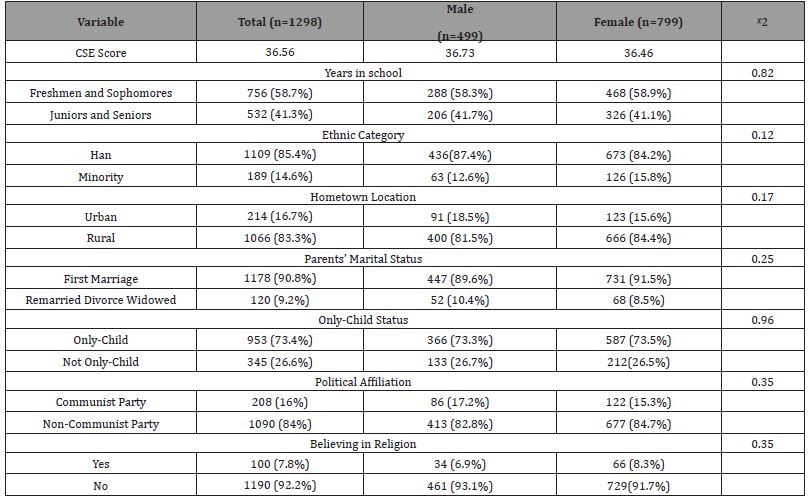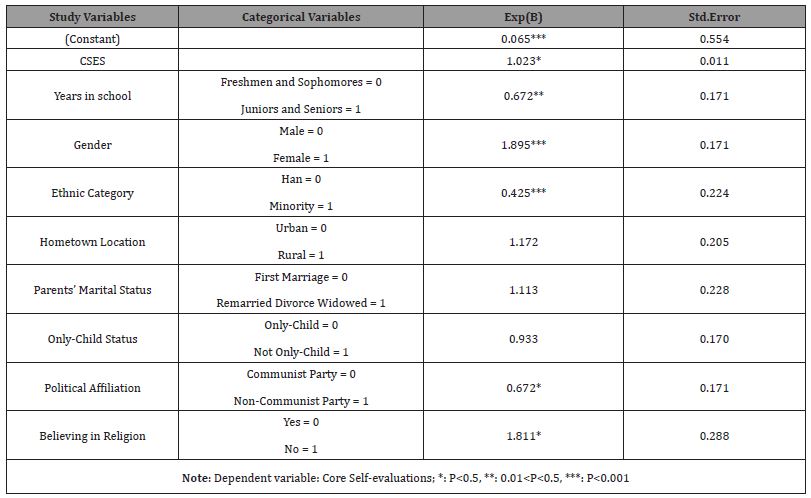 Research Article
Research Article
The Effect of Core Self-Evaluations on Chinese College Students’ Academic Record
Jie Zhang1* and Lian Xu2
1Shandong University School of Public Health, China, SUNY Buffalo State University Department of Sociology, USA
2Central University of Finance and Economics School of Social Development, China
Jie Zhang, Shandong University School of Public Health, China, Department of Sociology, SUNY Buffalo State University, USA
Received Date: July 15, 2024; Published Date: September 23, 2024
Abstract
Background: Since Judge and colleagues introduced the concept of core self-evaluations (CSE) in 1997 [1], numerous researches has been done about the relationship between CSE with job satisfaction, job performance, subject well-being, stress coping strategy et al. Some Chinese scholars introduce Judge’s theory into China. In addition to workers, housewives, students are also the main research objects.
Methods: We studied a sample of Chinese college students with their CSE, academic record, and a number of demographic variables such as gender, grand, hometown location, et al.
Results: CSE can predict the academic performance of Chinese college students. Students with higher scores on CSE tend to get good academic record.
Limitations: Core self-evaluation has been proved to be universal, but Chinese people’s personality traits are different from Americans, so Judge’s CSE may not fully reflect the characteristic of Chinese people.
Conclusion: Our results revealed that except the work area, CSE can also apply to learn area. As a personality characteristic, college students’ CSE has a significant effect in predicting their academic performance.
Keywords: Core self-evaluation; Academic record; College Student; China
Introduction
Judge, et al. [1] integrate study of personality on job satisfaction and proposed a higher order construct they termed core selfevaluations (CSE). They defined it as the bottom-line evaluations that individuals hold about themselves and their self-worth. According to Judge et al. [1], Judge, Erez and Bono [2], Judge, Locke, et al. [3], this construct is a broad dispositional trait that it is indicated by four more specific traits--self-esteem, generalized selfefficacy, locus of control and emotional stability. Self-esteem is the most fundamental and broad self-evaluation as it represents the overall value that one places on oneself [4]. Generalized self-efficacy is an evaluation of how well one can deal with life’s challenges [5]. Internal locus of control reflects one’s evaluation of one’s ability to manage life outcomes. Emotional stability (low neuroticism) indicates a stable person, who is free of debilitating negative emotions such as anxiety. According to Judge et al. [1], all these traits are broad in scope, fundamental to defining an individual’s personality, and carry a fundamental evaluation or judgment about oneself. Then Judge, et al. [6] study the relationship of the four traits of CSE with job satisfaction and job performance. They find these traits are high correlated to job satisfaction and job performance. Further research and refinements may uncover a “supertrait” which could be one of the useful predictors of performance and attitudes across jobs. Based on the core self-evaluations theory, Judge, et al. [7] developed a direct measure of this trait-Core Self- Evaluations Scale (CSES) which consists of 12 items. It is a direct and relatively brief measure of the trait. Results indicated that the 12-item CSES was reliable, displayed a unitary factor structure, correlated significantly with job satisfaction, job performance, and life satisfaction, and had validity equal to that of an optimal weighting of the 4 specific core traits (self-esteem, generalized selfefficacy, neuroticism, and locus of control), and incremental validity over the 5-factor model. Overall, results suggest that the CSES is a valid measure that should prove useful in applied psychology research. Their results suggest that the CSES is a valid measure that should prove useful in applied psychology research [8].
The cross-cultural research of CSE has come up with same conclusion. Judge, et al. [9] select some Spanish and Holland college students and employees as the subjects, and use the Spanish and Dutch version of CSES as measure tool. Results show that the scales’ reliability and validity keep consistent with the American version. In 2005, Judge et al. investigate 183 college students and 251 employees and find that Core Self-evaluations and Goal Selfconcordance are significant associated. This means that individuals with positive self-regard were more likely to pursue goals for intrinsic and identified (value-congruent) reasons [10]. In 2010, hypothesized relations of core self-evaluations with objective as well as subjective career success were confirmed [8].
In china, due to the different cultural background, core selfevaluation in the application of Chinese people is still lack of rigorous proof. At present, both indirect measurements and direct measurements about CSE are applied. Some scholars use four specific scales of self-esteem, generalized self-efficacy, locus of control and emotional stability to measure CSE; others revise Judge’s CSE scale to adapt to China’s specific conditions. Standardized measurement of the core self-evaluations is still a hot issue in China. Many studies have proved that Core Self-evaluation is a deep and stable personality characteristic, but most of them focus on job or career field. In this study, we will apply the theory of CSE into learning area to find whether or not the CSE can predict college students’ academic performance.
Method
The Sample
Data for this study are from a survey conducted on a fouryear university in Beijing, China, in Fall Semester of 2012. The survey was executed by systematic random sampling which was conducted with the SPSS program to select the samples. A total of 1,298 students evenly from freshman, sophomore, junior, and senior classes were participated in the questionnaire survey.
Instruments
In this study, we use a full-length questionnaire that includes the measure of the CSES [7] as well as a number of demographic variables. The Chinese version of CSES was translated and back translated a number of times and confirmed to accurately reflect the meaning of the scale in the original English version. The scale includes 12 items and each item have 5 options ranging from 1 (very strongly disagree) to 5 (very strongly agree).
In the study, the dependent variable is college students’ academic records. We measured it by one item: “how do you recommend your academic records last semester?” There 4 options for this item from 1(higher) to 5 (lower). But, in our study we divide college students’ academic records into two kinds of good and bad. In order to investigate the relationship between CSE and college students’ academic records, we have control a number of demographic variables includes years in school (freshmen and sophomores recorded as 0 and juniors and seniors recorded as 1), gender (“male” recorded as 0 and “female” recorded as 1), ethnic category (“Han” recorded as 0 and “minority” recorded as 1), hometown location (“urban” recorded as 0 and “rural” recorded as 1), parents’ marital status (“first marriage” recorded as 0 and “remarried divorce widowed” recorded as 1), only-child status (“only-one child” recorded as 0 and “not only-child” recorded as 1), political affiliation (“communist party” recorded as 0 and “noncommunist party” recorded as 1) and religion (“yes” recorded as 0 and “no” recorded as 1).
Administration of the survey
This survey was strictly executed by random sampling. First, the student roster was obtained from the university administration and exported into the SPSS data program. Then by using the SPSS program to do a systematic random sampling a list of the randomly selected students was created. With the help of the University Student Personnel Department, we were able to call up all the students on the random sampling list for the questionnaire survey. The questionnaire surveys were conducted in classrooms. The trained staff members were there to ensure the procedure going on well. Informed consent was obtained from each student participant. They had the rights to refuse the survey or quit whenever they want.
Data analyses and results
Descriptive presentation of the sample
Table 1 shows these college students’ average score of CSES and gender difference do not exist. It also illustrates the demographic distribution of the sample. In the table, “Hometown Location” refers to whether the student comes from rural or urban areas. “Party Affiliation” indicates if the student is a Chinese Communist Party (CCP) member, a political status in the student population. In today’s China, a CCP party or league membership is usually an indication of the individual’s integrity and ability to socialize and work with others. In order to observe the difference between grades, we recode the “freshman” and “sophomore” into “freshmen and sophomores” and “junior” and “senior” into “juniors and seniors.”
Major Factors Related to academic records
In Table 2, we use a binary logistic regression models to
measure the relationship between academic records and CSES,
personal (gender, ethnic category), family (hometown location,
parents’ marital status), and social (only-child status, political
affiliation) factors. It shows that such control variables as
hometown location, parent’s marital status and only- child status
has no significant effect on academic records, but year in school
(0.001 Table 1: The Score of CSES and Demographic Characteristics of the Sample with Gender Comparisons. Table 2: Major Factors Related to Academic Records: A Binary Logistic Regression Analysis. Core Self-evaluations (CSE) is a deep and stable personality
characteristic. Since Judge et al. proposed this conception [1], most
researches about CSE are about job satisfaction, job performance,
subject well-being, stress coping strategy. For instance, the core
self-evaluations concept has been proved to be positively related to
goal self-concordance. It means that individuals with positive selfregard
are more likely to pursue goals for intrinsic and identified
(value-congruent) reasons [10]. Few studies have addressed the
core self-evaluation into other fields. But as this study showed us,
the CSE theory can totally applied to learning area. In this study,
we find that CSES are significantly associated with academic
records. It means that CSES can predict college students’ academic
performance. Students who score higher on CSES probably perform
better in learning progress. However, scholars, domestic and overseas, all have different
views on Judge’s CSES. According to Chinese specific conditions,
it should be adjusted. We need to break through the Core Selfevaluations’
research areas, and promote the study of college
students’ CSE, enrich correlate study on the relationship between
college students’ personality traits and learning attitudees,
behaviors and feelings, enhance the theoretical value of the core
self-evaluations. This study was supported by China Ministry of Education
Project 211 through the Central University of Finance and
Economics (09SH003).

Discussion
Funding
References
- Judge TA, Locke EA, Durham CC (1997) The Dispositional Causes of Job Satisfaction: A Core Evaluation Approach. Research in Organizational Behavior 19: 151.
- Judge TA, Erez A, Bono JE (1998) The Power of Being Positive: The Relation Between Positive Self-Concept and job Performance. Human Performance 11(2/3): 167.
- Judge TA, Locke EA, Durham CC, Kluger AN (1998) Dispositional Effects on Job and Life Satisfaction: The Role of Core Evaluations. J Appl Psychol 83(1): 17-34.
- Locke EA, McClear K, Knight D (1996) Self-esteem and work. International Review of Industrial & Organizational Psychology 11: 1-32.
- Smith RE (1989) Effects of coping skills training on generalized self-efficacy and locus of control. J Pers Soc Psychol 56(2): 228-233.
- Judge TA, Boudreau JW, Boswell WR (2001) Effects of Personality on Executive Career Success in the United States and Europe. Journal of Vocational Behavior 58(1): 53-81.
- Judge TA, Erez A, Bono JE, Thoresen CJ (2003) The Core Self-Evaluation Scale: Development Of A Measure. Personnel Psychology 56(2): 303-331.
- Stumpp T, Muck PM, Hülsheger UR, Judge TA, Maier GW (2010) Core Self-Evaluations in Germany: Validation of a German Measure and its Relationships with Career Success. Applied Psychology: An International Review 59(4): 674-700.
- Judge TA, Van Vianen AEM, De Pater IE (2004) Emotional Stability, Core Self-Evaluations, and Job Outcomes: A Review of the Evidence and an Agenda for Future Research. Human Performance 17(3): 325-346.
- Judge TA, Bono JE, Erez A, Locke EA (2005) Core Self-Evaluations and Job and Life Satisfaction: The Role of Self-Concordance and Goal Attainment. J Appl Psychol 90(2): 257-268.
-
Jie Zhang and Lian Xu. The Effect of Core Self-Evaluations on Chinese College Students’ Academic Record. Acad J Health Sci & Res. 1(4): 2024. AJHSR.MS.ID.000516.
Core self-evaluation; Academic record; College Student; China
-

This work is licensed under a Creative Commons Attribution-NonCommercial 4.0 International License.






